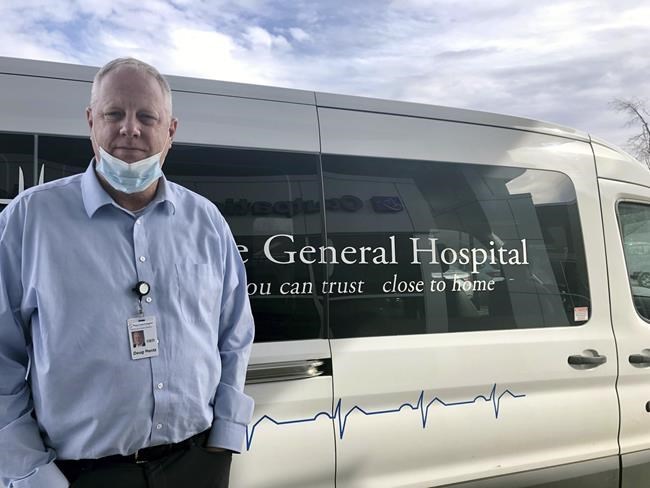
Roane General Hospital Chief Executive officer Doug Bentz is shown outside the hospital's entrance Tuesday, Dec. 21, 2021, in Spencer, W.Va. Roane General Hospital operates the main COVID-19 vaccination clinic for Roane County, an hour north of the state capital of Charleston.
December 25, 2021 - 6:39 AM
SPENCER, W.Va. (AP) — Chania Batten has as much reason as anybody to feel pandemic fatigue.
As a nurse staffing a drive-thru clinic at the only hospital in rural Roane County, West Virginia, she has spent months patiently answering questions, dispelling misinformation and reassuring the skeptical that COVID-19 shots are the key to beating back the coronavirus.
Batten shudders at the thought of the pandemic entering another calendar year.
“It is frustrating,” said the mother of two young children. “We all want to get back to our lives.”
Soon after the first vaccines were approved for use a year ago, West Virginia briefly led the nation in getting people the shots, according to the Centers for Disease Control and Prevention. But the state quickly hit a wall of resistance and its ranking began to slip. It's unclear how far it fell because of discrepancies between state and federal figures, but the struggle in Roane County suggests there is plenty of room for improvement.
Only about 45% of the county's population is fully vaccinated against the coronavirus. Nearly one-third of the state's 55 counties are under 50%, according to the CDC.
Reasons vary for residents’ struggles to embrace the vaccine. And Batten, one of the people on the front lines of a long, uphill battle to persuade the often unpersuadable, has probably heard most of them.
“There’s still, honestly, a lot of questions about the vaccine and what’s in it,” she said. “There’s a lot of people who are still scared because there’s not enough information out there for them. You have all that paranoia.”
But now, with the omicron strain of the virus suddenly raging through the U.S. population, the urgency of getting people to embrace the only effective known method of mitigating the virus has been ramped up.
State hospitals continue to be stressed, warning that patient numbers are growing and staffing levels are shrinking. Projections show that the number of people hospitalized for the virus during the holiday season will approach the record of more than 1,000 set in September.
Roane General Hospital operates the main COVID-19 vaccination clinic for Roane County, an hour north of the state capital, Charleston. It's perched on a hillside in Spencer, population 2,000, where Bing Crosby’s “White Christmas” and other holiday songs blare out of speakers throughout the town square. The 484 square mile (1,250 square kilometer) county has 14,000 residents.
In addition to her regular shift inside the hospital, there have been times when Batten was the only nurse staffing the drive-thru, sometimes with as many as a dozen vehicles in line.
“It can become overwhelming,” Batten said, holding a clipboard in the chilly December air. “But it’s my job.”
Batten said she still likes the work, and if she had to she'd go door to door trying to convince people to get the shots. But in this part of West Virginia, not much seems to get through.
Republican Gov. Jim Justice has tried giveaways and appearing with a dour-faced bulldog named Babydog to try to convince people to get the shots. He has given away hundreds of thousands of state dollars through drawings to vaccinated residents. Last month he presented a $50,000 check to a Roane County middle school to encourage students and faculty to get vaccinated.
The hospital’s marketing campaign on the importance of COVID-19 shots includes daily messages on social media, radio advertising and physician testimonials. But hospital CEO Doug Bentz said he’s not sure how those messages are interpreted.
“In fact, I think sometimes the media hurts things because people are so dug in politically,” Bentz said in his office recently. “Instead of making a rational decision, they feel like they’ve got to stand on some principle. There’s a lot of misinformation out there. And unfortunately I think there’s just not the trust that we have in our government, in the media, for people to believe it.”
The wear and tear on the nursing profession is obvious. In 2020 alone, 1,700 nurses opted not to renew their licenses in West Virginia.
Batten, who recently recovered from a bout with the virus herself, doesn't expect to join those who stop trying.
“You’re still coming out here and working and doing your job, but then there’s still people not wanting to come and get vaccinated,” Batten said. “Or they don’t see what other people are going through, especially people who have lost loved ones in the hospital.”
Despite the effort to spread the word, a lot of people don't even know the outdoor clinic is available. Batten says people ask her about the vaccine when she's working inside the hospital. Others face different obstacles, either because of their age or transportation challenges.
But then there are the voices of resistance. Whether on moral, personal or political grounds, some people say they have no intention of being vaccinated.
Roane General, a nonprofit hospital, has just 25 acute-care beds to serve the whole county. In November the hospital dedicated an expansion of its facilities that cost more than $28 million.
Still, the new strain of the virus threatens to overwhelm them.
“I don't think the general public understands what’s going on inside the walls of the hospitals, inside the emergency rooms and inside the inpatient care floors," Bentz said. "It’s a different world. At Roane, we have limited resources. We have limited specialists. Yet we are being forced to provide ICU level-type care, high acuity, with the resources that we have. It’s not always ideal. But we have no choice.”
News from © The Associated Press, 2021